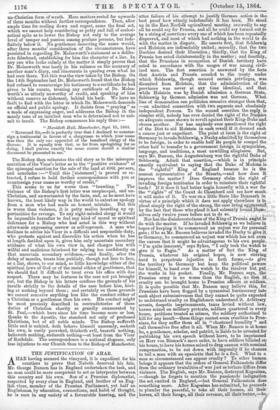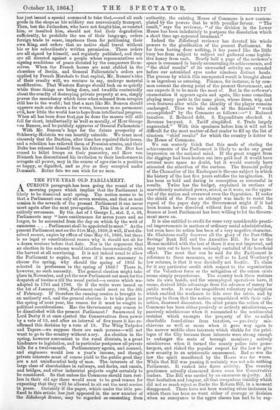THE JUSTIFICATION OF AHAB.
AHAB having secured the vineyard, it is expedient for his courtiers to prove that Naboth deserved his fate. Mr. George Bunsen has in England undertaken the task, and no man could be more competent to act as interpreter between this country and his own. Son of a Prussian diplomatist, respected by every class in England, and brother of an Eng- lish vicar, member of the Prussian Parliament, yet half an Englishman by education, connections, and habit of thought, he is sure in any society of a favourable hearing, and the utter failure of his attempt to justify German action is the best proof how utterly indefensible it has been. He stood. up in the East Norfolk agricultural meeting avowedly to say all he could say for Prussia, and all he could say turned out to be a string of assertions every one of which has been repeatedly disproved, and most of which had nothing in the world to do with the matter in dispute. He asserts first, that Schleswig and Holstein are indissolubly united; secondly, that the two Duchies desired their liberation ; thirdly, that the King of Prussia has acted disinterestedly in the matter; and fourthly, that the Prussians in occupation of Danish territory have acted in accordance with the usages of war among civil- ized men. The first assertion is answered by the facts that Austria and Prussia acceded to the treaty under which Schleswig, though secured certain privileges, was disunited from Holstein, that the administration of the provinces was never at any time identical, and that while Holstein was by Danish admission a German State, Schleswig by German admission was not German. What line of demarcation can politician conceive stronger than that, —an admitted connection with two separate and absolutely independent Powers. To the second assertion the reply ia simpler still, nobody has ever denied the right of the Dulies on adequate cause shown to revolt against their King-Duke and choose another. Nor has say-body ever questioned the right of the Diet to aid Holstein in such revolt if it deemed such a course just or expedient. The point at issue is the right of Germany to invade Schleswig, a Duchy admitted by themselves to be foreign, in order to enable half its people to compel the other half to transfer to a government foreign in sympathies, language, and traditions, a most unwilling allegiance. But, says Mr. Bunsen, the Augustenburg was the rightful Duke of Schleswig. Admit that assertion,—which is in principle exactly equivalent to saying that the Duke of Modena is the "rightful" King of England because he is the nearest representative of the Stuarts,—and how does it improve the matter ? Does Germany claim the right or invading foreign territories in order to reinstate their rightful lords ? If it does it had better begin honestly with a war for the " rights" of the Count de Chambord and see how much it will make of it. To war on a little State like Denmark in virtue of a principle which it dare not apply elsewhere is to plead simply the right of the strong, the case being aggravated by the fact that those who plead it had solemnly bound thorns _ selves only twelve years before not to do so. t.a:. Nor has the disinterestedness of the King of Prussia aught to do with the matter. If he invaded Schleswig as we believe in hopes of keeping it he commenced an unjust war for personal gain ; if he as Mr. Bunsen believes invaded the Duchy to give it to Germany, he commenced an unjust war which has not even the excuse that it might be advantageous to his own people. " I'm quite innocent," says Sykes, "I only took the watch to give it to Fagin." As a matter of fact the King of Prussia, whatever his original hopes, is now striving hard to perpetrate injustice in both forms,—to give the territory to Germany but keep the political powers for himself, to hand over the watch to the receiver but put the works in his pocket. Finally, Mr. Bunsen says, the Prussian army is no worse than the Euglish, no ease of cruelty can be brought home to Prussian officers or soldiers. It is quite possible that Mr. Bunsen may believe this, for Prussians have been flogged by a tyrannical bureaucracy into such abject submissiveness that they cannot be quite expected to understand cruelty as Englishmen understand it. Arbitrary arrests, despotic imprisonments, taxes levied without law, horses seized on military pretexts, soldiers quartered in every house, petitions treated as crimes, the soldiery authorized to kill for any insult—these things cannot seem cruelties to Prus- sians, for they suffer them all in " chastened humility " and call themselves free after it all. When Mr. Bunsen is at home he, a gentleman, scholar, and patriot, is liable to be arrested for publishing his own speech without leave, to be imprisoned on Herr von Bismark's mere order, to have soldiers billeted on his house, to have his horses seized to drag cannon with nominal compensation, to be cut down with impunity if he chances to tell a man with an epaulette that he is a fool. What to a man so circumstanced can appear cruelty ? To other human beings it appears that the orders of General Falkenstein differ from the ordinary brutalities of war just as torture differs from violence. The English, says Mr. Bunsen, destroyed Kagosima, —though he forgets to mention the passionate indignation the act excited in England,—but General Falkenstein does something more. After Kagosima has submitted, he proceeds to plunder the peaceful, to take all their houses, all their horses, all their forage, all their revenue, all their butter,—he has just issued a special command to take that,—and all such goods in the shops as his soldiery can conveniently transport. Then, lest the Jutlanders, who have not fought him, or resisted him, or insulted him, should not feel their degradation sufficiently, he prohibits the use of their language, orders foreign trade to cease, imprisons them for petitioning their own King, and orders that no native shall travel without his or his subordinate's written permission. These orders are all signed by himself, and regularly published, and they are all directed against a people whose representatives are signing conditions of peace dictated by the conquerors them- selves. When the French horses are next stabled in the churches of Berlin, and General Falkenstein's orders are applied by French Marshals to that capital, Mr. Bunsen's idea of their cruelty will, we venture to say, undergo material modification. That Western Europe should look on so quietly while these things are being done, and twaddle contentedly about the cruelty of destroying private property at sea, simply proves the ascendancy which force when released from scruples still has in the world ; but that a man like Mr. Bunsen should approve such acts shows a far worse, because m)re permanent evil, how little the world has to hope from intellectual progress. When all has been done that4san be done the masses will still fall far short, intellectually as well as morally, of Herr George von Bunsen, and he publicly approves of General Falkenstein !
With Mr. Bunsen's hope for the future prosperity of Schleswig-Holstein we can heartily coincide. We trust most sincerely that the Duchies, after time has repaired their losses, and a rebellion has relieved them of Prussian armies, and their Duke has released himself from his fetters, and the Diet has ceased to billet troops on their peasantry, and Herr von Bismark has discontinued his invitation to their landowners to arrogate all power, may in the course of ages rise to a position as happy, as dignified, and as free as they occupied under Denmark. Better fate we can wish for no men.































 Previous page
Previous page